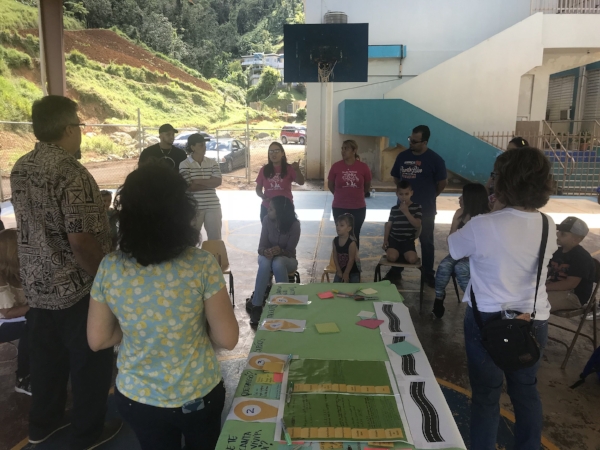Dreaming in Barranquitas
March 3, Mel and team made the trek to the mountain town of Barranquitas, located in the center of the island, for the fifth and final workshop. Barranquitas comes from the word “barrancas”, or cliffs, which is what the town is famous for. The mountains are so steep and covered in forests, that it is hard to believe anyone lives there but it is none the less breathtaking to see.
The river running beside Escuela Inocencio Contron Zayas
Escuela Inocencio Cintron Zayas is a Montessori school located in a steep valley directly next to a river and plantain farms. To note, the location of the school has caused a problem because, after Hurricane Maria, the school was flooded with mud up to 4 feet high and lost all power and communications.
Many of those who came to participate did not know about the event until two days before, and a few did not hear anything until the day before due to slowed communications. Despite the short notice on their end, they really pulled together and made sure that the ball kept rolling! It didn’t hurt that a wonderful neighbor made homemade chicken soup for us as well.
Before the workshop began, we noticed that there was a plantain farm on the steep hillside being plowed by two oxen for new plants. It looked straight out of a jibaro story, and we all took a moment to look at the hard work being done on that early Saturday morning. We were preparing to begin the workshop when they came down to us in their truck with oxen in tow to see what was happening at the school. As we exchanged stories, we found the farmers did not own the land but rather rented out their oxen for farm work all around the area. The two farmers lend their services and animals for $150 for 6 hours of work. Agriculture is an important aspect of Barranquitas, but many lost their resources to keep their crops going. We had invited them to stay, but work beckoned them.
Wrapping up work on the plantain farm, oxen in tow.
We began the workshop and as time continued, more people showed up to participate and share their stories.
What is remarkable to the area is the proximity to nature, the closeness of neighbors and families around the area, the good heart of the people, the sound of the river and the serenade of the coqui at night, the feeling of being at peace with nature.
Setting up the materials for the workshop with Mel and Marti.
Once everyone was settled, Melvin broke the ice by explaining who we were and the purpose of our visit. Melvin made the atmosphere relaxed by telling our story and expressing his deep desire to help.
After the participants shared their stories and challenges after Maria, we began to talk about the needs of the community. Of equal importance were electricity, communications, housing, and healthcare. Barranquitas, being the mountain town it is, experienced different hardships than the other cities we visited. Because of the nature of its location, it was initially nearly impossible to get aid to the area quickly, with the few main roads available being closed, bridges collapsed, and huge mudslides posing huge obstacles. This also heavily affected communications in terms of cell service and being able to meet and communicate with their neighbors. In order to get electricity back to the town in as swift a fashion as possible, the community was able to pull together enough money to bribe the electrical company to come and service Barranquitas to restore a sense of normalcy. There were two women in attendance who shared their housing stories and how FEMA only gave them $4,000 dollars to repair their absolutely demolished, wooden houses. They told us the vast majority of the town's wooden houses were demolished in the storm and few resources exist to rebuild them to be more stable.
The team listens as locals tell their stories of how Hurricane Maria affected them and their neighbors.
With lessons learned from Hurricane Maria, they expressed the need to have a centralized community center where everyone can obtain information in case of emergencies. In terms of medical care especially, residents have to travel to a major city to get the most basic of services, such as San Juan, Ponce, and Caguas. It would be beneficial to have locations and recommendations prepared for any situation, should it be dire. Not only that, but they identified the importance of having a place to take various classes, get involved with community projects, and a cultural center for visiting folks wanting to see what Barranquitas has to offer.
The next step of the “Dream Board”, was to identify community talents and how they could organize the community. One of the most prominent talents was right there in our workshop. Jenniffer M. Berrios runs a not-for-profit, Casa Pensamineto De Mujer, in the Barranquitas area to support women with breast cancer as well as victims of sexual assault, violence, and stalking...free of charge. She has close ties to the people in the community and has handled the obstacles of her town with sensitivity, grace, and tenacity.
Mel giving a donation of a laptop to an educator of the Montessori school as a tool and a symbol of our partnership.
There is no doubt that the beautiful people of Barranquitas are resilient, enigmatic, and collaborative. We cannot wait to continue to work with them and see how their journey for a better future continues!




